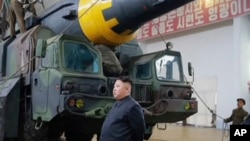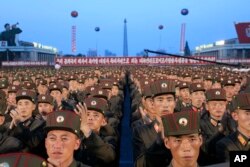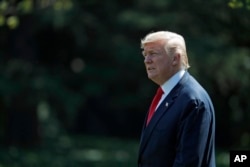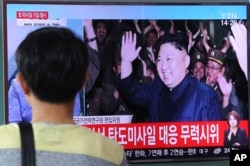The U.S. is reported to have concluded that North Korea has successfully built a miniaturized nuclear warhead it could fit inside its missiles in what could be a major weapons breakthrough for the reclusive communist nation.
Two U.S. media outlets, The Washington Post and NBC News, said Tuesday that the Defense Intelligence Agency reached the conclusion in the last month, advancing the timetable for Pyongyang's efforts to become the world's ninth full-fledged nuclear power.
The newspaper quoted the defense agency's assessment that "North Korea has produced nuclear weapons for ballistic missile delivery, to include delivery" by intercontinental ballistic missiles. North Korea has said in recent days that the ICBM it tested in a launch last month was capable of hitting the U.S. mainland, an advance it had not previously claimed.
It is not known whether North Korea has tested the smaller designed nuclear warhead, although it said last year that it had. After one successful long-range missile test in July, state media declared North Korea as a "proud nuclear state" with an ICBM rocket "that can now target anywhere in the world."
The Post said the U.S. has concluded that Pyongyang has now amassed 60 nuclear weapons, although some experts think the number is smaller, perhaps half that.
In early 2016, the U.S. had concluded that Pyongyang was struggling to build intercontinental ballistic missiles, but even then assumed that it would eventually be able to produce them and have nuclear-armed missiles capable of reaching all of its adversaries.
The defense agency's nuclear warhead conclusion comes as the U.S. and other world powers have focused new attention on North Korea's military ambitions. The United Nations Security Council unanimously imposed new sanctions on Pyongyang last weekend in an effort to cut $1 billion of its $3 billion in annual export income.
U.S. President Donald Trump commended the international community Tuesday for confronting North Korea over its nuclear weapons development, even as his United Nations envoy said she is skeptical that the latest sanctions will deter Pyongyang.
Trump, on what he calls a working vacation at his golf resort in New Jersey, said in a Twitter comment, "After many years of failure, countries are coming together to finally address the dangers posed by North Korea. We must be tough & decisive!"
But Trump's U.N. ambassador, Nikki Haley, told NBC's "Today Show" that the newest United Nations sanctions are not "going to stop our North Korea problem." Nonetheless, she said the penalties would "send a very strong message."
She reiterated that Trump "has said all options are on the table," including an armed strike to thwart the North Korean threat, Pyongyang's claim that its missiles can now reach the U.S. mainland.
"We’ll do whatever it takes to counter North Korea," she said.
As for North Korean leader Kim Jong Un, Haley said, "He has to decide if he strikes the United States, is that something he can win?"
North Korea vowed Monday to persist in its nuclear weapons development program, rejecting calls from the international community to rein in its aggressive military actions.
Pyongyang's United Nations mission contended that new U.N. sanctions against it for its missile tests were a "flagrant infringement upon its sovereignty," with state media claiming they were the result of a "heinous U.S. plot to isolate and stifle" the reclusive, communist country.
North Korea told a security conference of key regional leaders in Manila that it would never bargain away its development of nuclear weapons or ballistic missiles, and said that it would teach the United States a "severe lesson" with nuclear strategic force if Washington launches an attack against it.
In the U.S., a new CBS News poll showed Americans are uneasy about the possibility of conflict with North Korea and wary about Trump's ability to handle the situation.
The survey conducted in recent days showed that Republicans, much more than Democrats or political independents, are confident in Trump's approach to Pyongyang.
The poll said that overall 35 percent of Americans are confident in Trump's ability to handle the North Korea situation, while 61 percent are uneasy.
In other findings, CBS said 60 percent of Americans believe that North Korea's nuclear development program is a "threat that can be contained," while 29 percent think it is a "threat requiring military action now," and 7 percent say it is "not a threat at all."
The survey said 72 percent are "uneasy about possible conflict," with 26 percent saying they are "confident things will be resolved."










